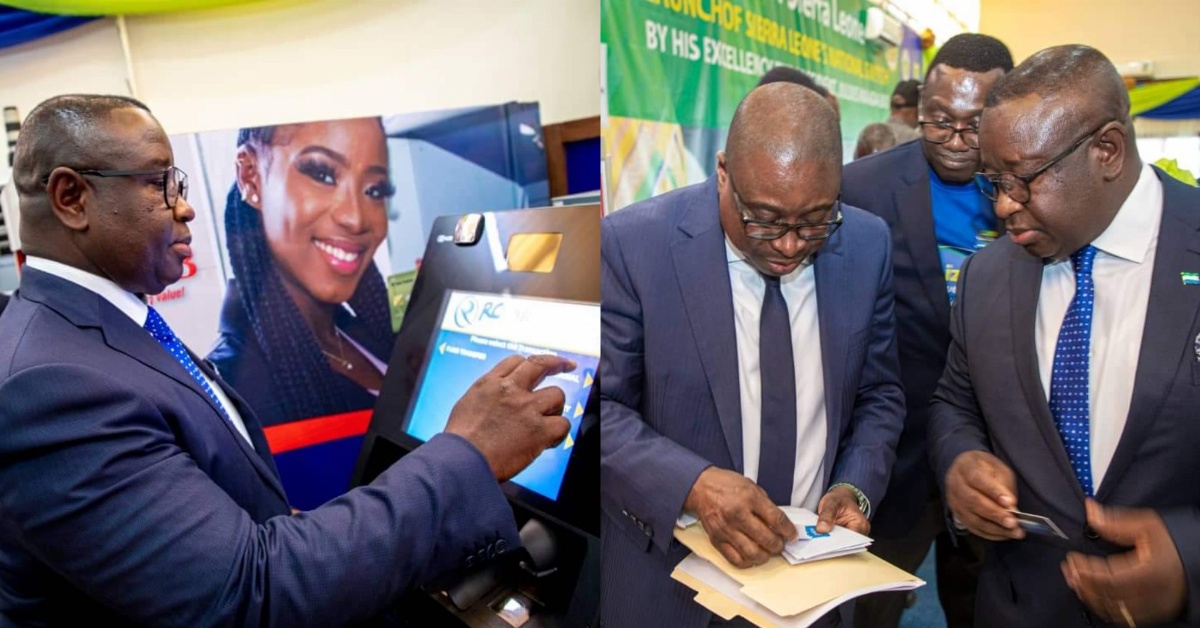President Julius Maada Bio has formally launched the National Payments Switch Service, a banking system that seeks to improve banking transactions among banks, starting with six banks in the country.
The already activated integrated service system allows Automated Teller Machines, ATMs, and cardholders of Ecobank, Guarantee Trust Bank, Rokel Commercial Bank, Sierra Leone Commercial Bank, Union Trust Bank, and United Bank of Africa to access money quickly in a more secure manner among the banks.
The national payment switch project started in early 2000 but did not go on as a result of a lack of confidence in the then government by the World Bank, which was approached to invest the sum of US$4 million a few months into the President Bio-led administration.
Due to the trust and confidence the World Bank had in President Bio’s government, the project was approved, and the funding package was tripled to US$12 million dollars.
President Julius Maada Bio, while thanking the World Bank for sharing his vision and for their very generous support in implementing the project in Sierra Leone, said, “Today, we are taking another major step forward in this era of the fourth industrial revolution.
“We are deploying and leveraging the power of technology to ease the rapid flow of millions of financial transactions within and across borders in seconds through a single interface. This new technology facilitates interconnection and interoperability among the channels of various players in the financial landscape. This would include commercial banks, microfinance institutions, mobile money operators, and financial technology firms (FinTech)”.

He added that the payment system was cost-effective and would, therefore, lead to increased commercial activities because banks could now issue more cards and other digital financial tools like point-of-sale systems, ATMs, online commercial portals, and more.
The President also noted that he had been reliably informed that the system would process transactions from all bank customers, regardless of the type of card they used, and routed them to a central switch for settlement at the Bank of Sierra Leone.
“I must mention that our APC predecessors tried but failed in their efforts to implement this project. But my government has been able to complete and implement this project because we are driven by an unflinching commitment to strengthen the role of the private sector and the banking and financial services sectors in our inclusive economic growth agenda.
“Even people in rural areas, where there is no bank or no physical financial service structure can now have access to financial services through electronic card payments or other digital financial tools. Those rural populations can do their financial transactions without having to endure time-consuming and expensive trips to the nearest financial services center.
“But I am even more excited about the National Switch because it will enable this government to deliver public services in a more effective and efficient manner. Social welfare payments, including pension and welfare benefits, can now be disbursed directly into the accounts of beneficiaries through the National Switch. This ensures timely and secure delivery and also maintains an electronic footprint of the transactions”.
The World Bank Representative, while congratulating President Bio, the government, and the people of Sierra Leone for achieving the remarkable milestone, said, “I will like to congratulate the government of Sierra Leone for the successful launch of the national payment switch. We recognise the strong efforts of the government to address critical constraints on the banking sector’s ability to finance and accelerate payment system mobilisation process.
“The official launch marked an important milestone in addressing the very short but detailed probability of the electronic payment system, and users experienced focus and customer advancement. Due to the effort of the government and Bank of Sierra Leone, the World Bank is calling on key financial institutions to take advantage of the services, while the World Bank is committed to financial inclusion in Sierra Leone,” she reiterated.
Acting Bank Governor, Dr Ibrahim Stevens, said that no time was better than now to launch the national switch, adding that that the process leading to the launch had gone through long challenges in the past, but due to President Bio’s inspirational guidance, the service had finally been launched.
“The government is moving towards a digital society and the Bank of Sierra Leone is spearheading the migration, especially for the financial system to be technology driven. With the modern payment system, the problem of delayed transactions is addressed with rapid forms of transactions involving billions of local and international currencies.
“This has created access to new markets, increased efficiency and cost savings, enhanced security, and improved the customer experience, thereby shifting the role of banking from the issuance of traditional bank notes to a modern and dynamic payment ecosystem,” he assured.




 1 Comment
1 Comment










Thank you my president